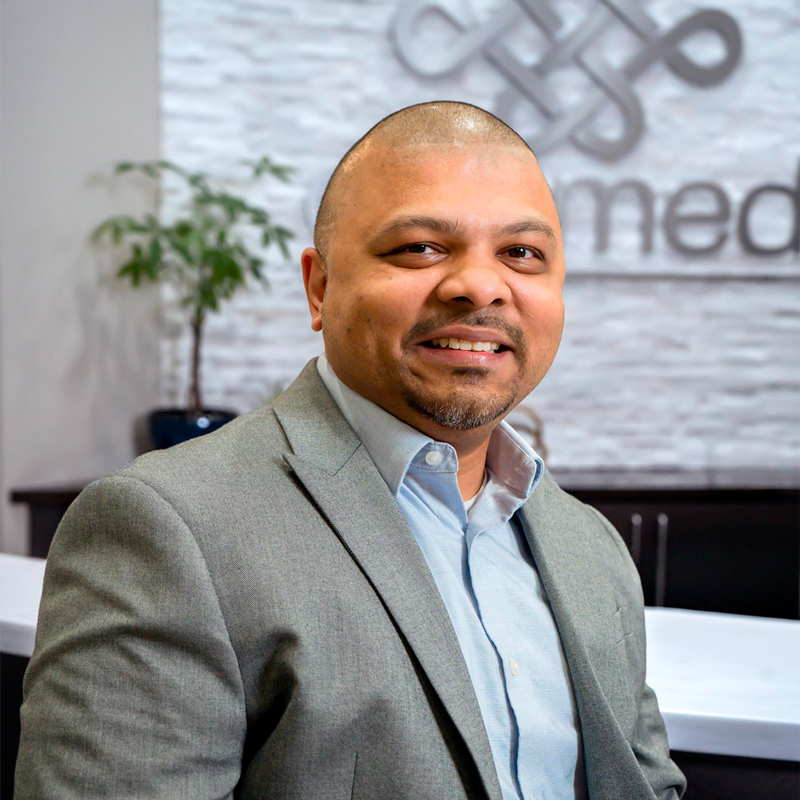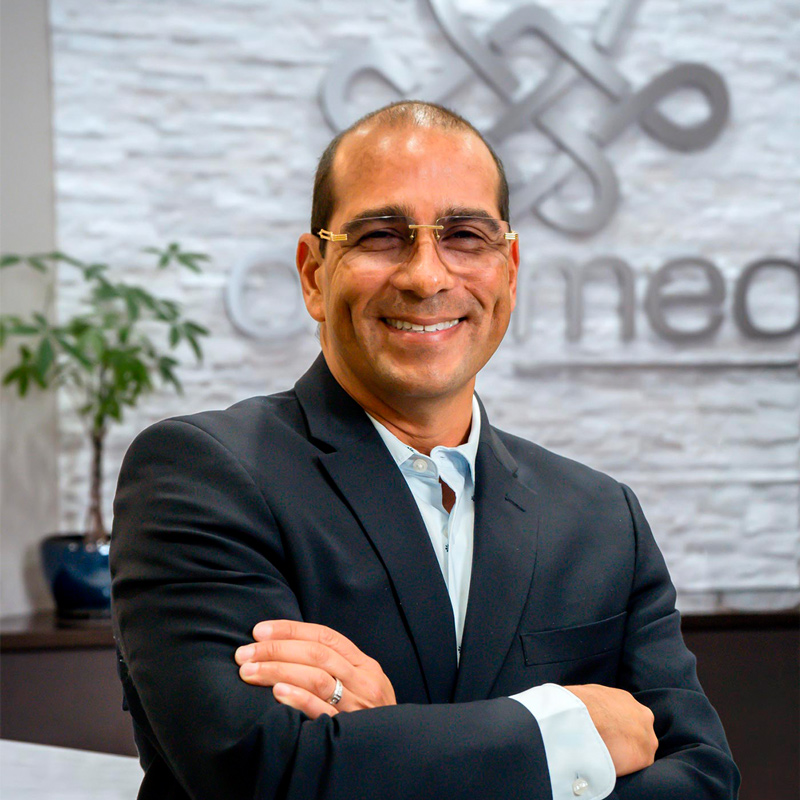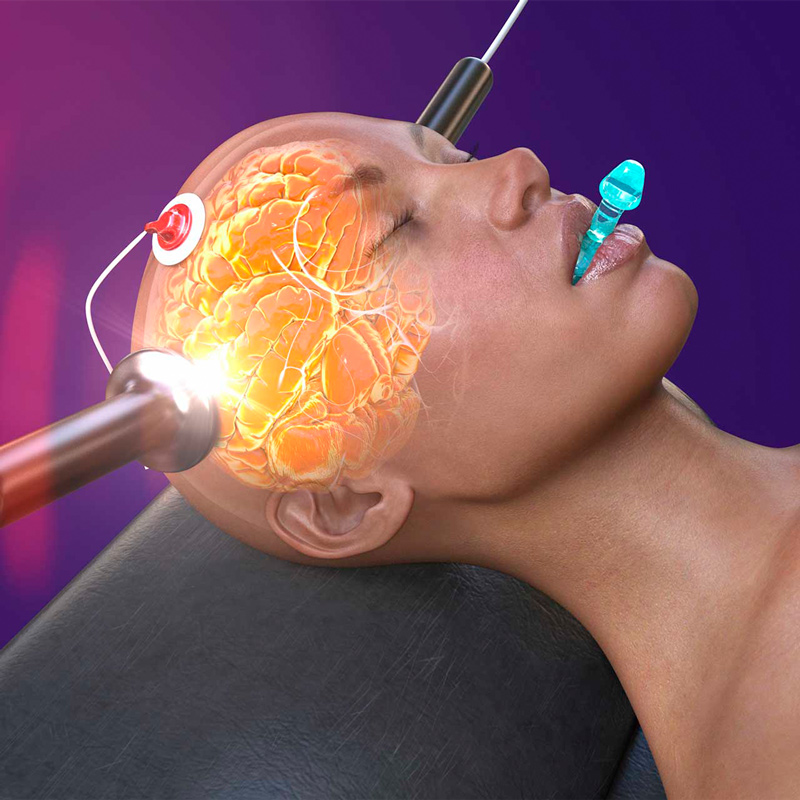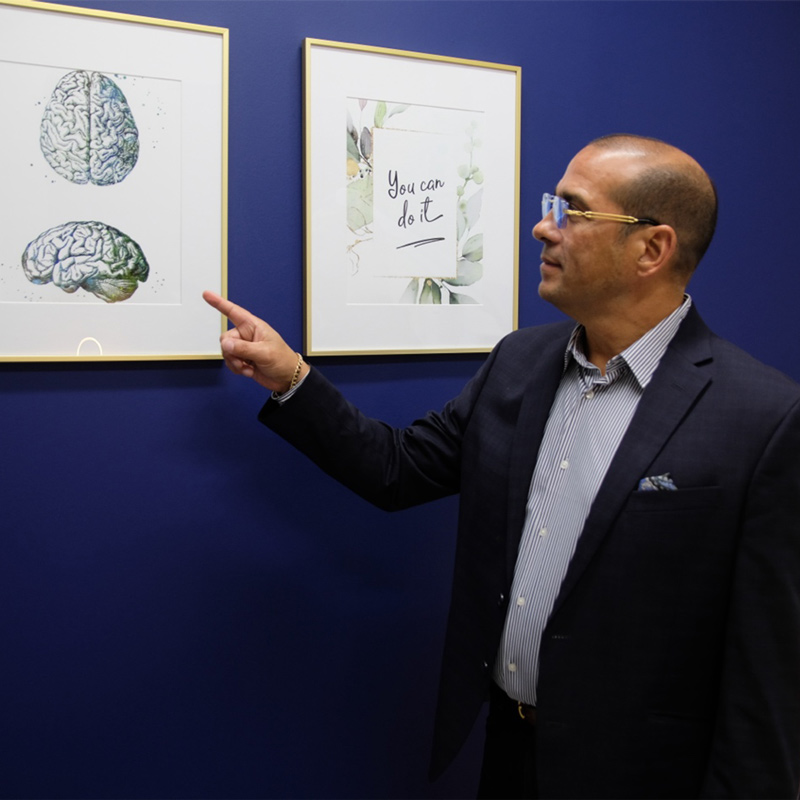Electroconvulsive Therapy (ECT)
ECT Orlando
Welcome to OneMed, where compassionate care meets cutting-edge treatments. Today, we explore Electroconvulsive Therapy (ECT), a powerful intervention for severe mental health challenges. These include refractory cases of depression, mood disorders, psychotic disorders, catatonia, to name a few conditions.
View Video About
How ECT Work
What is ECT therapy?
ECT Treatment Orlando
Electroconvulsive Therapy (ECT) is a medical treatment used to help people with severe depression and other serious mental health conditions. It involves applying a small, carefully controlled electrical current to the brain while the patient is under anesthesia. This current causes a brief seizure that “resets” certain brain circuits, improving mood and symptoms.
At OneMed Clinic in Lake Nona, Orlando, we use ECT when other treatments, like medications or talk therapy, haven’t worked well enough. Many patients are surprised at how effective it can be and how quickly they notice a difference.
Electroconvulsive Therapy Near Me
ECT Treatment at OneMed, Lake Nona, Orlando
At OneMed, our commitment to patient care extends beyond the treatment phase. We provide comprehensive support, including counseling services, medication management, and ongoing follow-up care to ensure sustained well-being.

1. ECT Initial Consultation
Your journey begins with an initial consultation with your primary psychiatrist.
During this meeting, your psychiatrist will assess your condition, discuss your symptoms, and review your medical history to determine if ECT is a suitable treatment option for you.

2. Second Opinion
Following the initial consultation, you will meet with another psychiatrist from our group.
A second opinion helps you understand the ECT procedure, its benefits, and risks, while confirming it’s the right choice for your needs.

3. Scheduling & Authorization
Once ECT is approved, our ECT Coordinator will schedule your sessions.
They will also work closely with your insurance provider to obtain authorization for the procedure, making the process as seamless as possible for you.

4. Medical Clearance
Before ECT, you’ll need medical clearance, including lab tests, X-rays, and an ECG.
These tests are essential to ensure your safety during the procedure. You may receive clearance either from our primary care team or from your own primary care physician (PCP).

5. ECT Treatment
After clearance, our ECT Coordinator schedules sessions at Advent Health.
Treatment sessions are typically scheduled on Mondays, Wednesdays, and Fridays. The number of sessions required varies for each individual, but most patients start experiencing improvement after 6-8 sessions.

6. ECT Post-Treatment Care
After ECT sessions, you’ll resume care with your primary team.
This includes follow-up appointments with your psychiatrist and PCP to monitor your progress, adjust medications if necessary, and provide any additional support you may need.
Throughout your ECT journey, our team at OneMed is dedicated to providing you with compassionate care and support every step of the way. We are committed to helping you achieve improved mental health and well-being.
How does ECT therapy work?
During treatment, you’ll be given anesthesia so you’re fully asleep and don’t feel anything. Electrodes are placed on the scalp, and a controlled electrical pulse is delivered to the brain. This creates a short, safe seizure that lasts less than a minute. The seizure triggers changes in brain chemistry, helping restore balance to mood-related pathways.
Does ECT therapy hurt?
No, the procedure itself does not hurt. You are asleep the entire time, and a muscle relaxant prevents your body from moving. Some people may feel a mild headache, jaw tightness, or muscle soreness afterward, but these side effects are usually short-lived and manageable.

Yes, ECT therapy is safe. Today, ECT is far safer than the outdated portrayals many people remember from movies or TV. Treatments are performed under strict medical supervision with a psychiatrist, an anesthesiologist, and trained staff present. Decades of research show ECT is effective and safe, especially when provided in a qualified health care setting. Our team does so at AdventHealth.
ECT often works faster than medication or therapy. Some patients begin noticing improvements in mood and thinking after just 3–5 sessions. For individuals in severe crisis, this speed can be life-saving.
An ECT session usually takes less than an hour from start to finish, with only a few minutes of actual treatment time. A typical course of ECT involves multiple sessions, often two or three times a week, for several weeks.
Yes, most patients return to their usual daily activities once treatment is complete. Some may continue with maintenance ECT sessions or combine ECT with medication and therapy for long-term stability.
At OneMed Clinic, our goal is always to help you not only manage symptoms. Our priority is also to help you get back to living your life fully and meaningfully.
Electric Shock Therapy
Electroconvulsive Therapy Treats
Electroconvulsive therapy treats people who have severe symptoms that don’t improve enough with medications, psychotherapy, or other standard treatments. It is not a first-line option, but when carefully chosen, it can make a remarkable difference.
At OneMed Clinic, we consider ECT when someone’s condition is severely affecting their daily life, such as when a person can’t work, care for themselves, or enjoy relationships because of their symptoms.
What are the conditions treated with ECT therapy?
ECT is primarily used for retaining the following conditions:
- Major depressive disorder (especially treatment-resistant depression)
- Bipolar disorder (particularly severe depression or mania)
- Schizophrenia (with certain severe symptoms, like catatonia or strong delusions)
Severe suicidality (when someone’s safety is at risk and rapid improvement is needed)
The strongest response is usually seen in severe depression. Research consistently shows that people with major depressive disorder, especially when medications haven’t worked, often benefit most.
At OneMed, we’ve seen patients regain hope and energy after struggling with depression for years.
ECT is not a standard treatment for anxiety disorders. However, when anxiety is part of severe depression or another major illness, patients may notice that their anxiety improves as their overall mood lifts. If anxiety alone is the main problem, other treatments are usually more effective.
ECT is not specifically used for anger problems. However, if anger is connected to an underlying condition like bipolar disorder or severe depression, treating the root illness with ECT can sometimes reduce irritability and improve emotional balance. There are studies which have shown ECT to improve aggression in certain patient populations such as those with autistic spectrum disorder.

ECT treatment for depression
ECT Treatment Orlando
Depression is the most common reason ECT is recommended. For people whose symptoms don’t get better with medications, therapy, or lifestyle changes, ECT can provide significant relief, often more quickly than other options.

What is ECT therapy for depression?
ECT for depression works by triggering controlled seizures that reset and rebalance brain activity. This helps restore mood regulation pathways. At OneMed, we explain it to patients as “giving your brain a healthy reset” when it feels stuck in depression.
What is the success rate of ECT for depression?
ECT is one of the most effective treatments for severe depression. Studies show response rates between 70–90%, which is much higher than typical success rates for antidepressant medications alone. Many patients experience rapid improvement in energy, mood, and daily function.
Benefits of ECT therapy
ECT Lake Nona
ECT can provide life-changing improvements for people who have struggled with mental health conditions for years. For many, it brings relief when nothing else has worked. The benefits are not only about lifting symptoms, but also about helping people regain their ability to live, work, and connect with loved ones again.
Who benefits most from ECT?
The people who benefit most are usually those with severe, treatment-resistant depression. Patients with bipolar disorder and schizophrenia may also see strong results, especially if symptoms are disabling.
At OneMed Clinic in Lake Nona, we’ve seen ECT give patients the ability to enjoy life again after trying multiple medications and therapies without success.


Who is a good candidate for ECT therapy?
Not everyone is a candidate for ECT, but for the right patient, it can be highly effective. The decision is always made after a detailed evaluation by a psychiatrist and a medical team.
Patients with serious medical risks, such as unstable heart conditions or certain neurological problems, may not be suitable. Safety is always the top priority, so careful screening is an integral part of the process.
You may qualify if you have severe depression, bipolar disorder, or another serious condition that has not responded to medications or therapy. Rapid improvement is another reason, such as when someone is experiencing suicidal thoughts and needs fast relief.
ECT is not recommended for patients who can be successfully treated with less invasive options like medications or psychotherapy. It’s also avoided in people with certain untreated medical conditions where the anesthesia or seizure could pose a risk.
The best candidates are those with severe, persistent symptoms that limit their daily life, especially when other treatments haven’t helped. At OneMed Clinic, we look at the whole person, their medical history, mental health, and goals, to decide if ECT is the right next step

Electroshock Therapy
Is ECT a last resort?
Many people think of ECT only as a “last resort,” but that’s not always the case. While it is usually considered after other treatments haven’t worked, there are situations where ECT is recommended earlier. For example, if someone is severely depressed, suicidal, or unable to function, ECT can be the safest and fastest way to bring relief. At OneMed Clinic, we carefully consider each patient’s unique situation before making this recommendation.
It may be time to consider ECT if you’ve tried several antidepressants without success, if therapy alone hasn’t improved your symptoms, or if your condition is worsening despite ongoing care. It’s also considered when fast improvement is needed, such as in cases of suicidal thoughts, psychosis, or refusal to eat and drink due to depression.
ECT is always given under the supervision of a psychiatrist and a medical team. At OneMed Clinic in Orlando, the process begins with an evaluation to see if you’re a good candidate. From there, we explain the procedure in detail, answer every question, and make sure you feel comfortable before starting treatment.

ECT side effects
Like any medical treatment, ECT does have side effects. Most are temporary and improve within hours or days. The most common include headache, confusion, or mild memory issues right after a session. For most people, these symptoms fade quickly. At OneMed, we monitor each patient closely to manage side effects and keep them safe.
The most common side effects are headache, jaw or muscle soreness, and short-term memory gaps. Some patients also feel tired or briefly disoriented after treatment. These are usually temporary and mild.
The most concerning side effect is memory loss. Some patients notice gaps in memory, especially for events that happened around the time of treatment. This usually improves over weeks to months, but in rare cases, certain memories may not return.
For most people, memory problems are temporary. While there can be some lasting gaps, especially for memories just before treatment, most patients regain normal day-to-day memory. Your long term memories remain intact as well as memories after the treatment. In short, you will not remember the procedure which is due to anesthesia as well as the therapeutic seizure. At OneMed, we discuss this openly before starting ECT, so patients know what to expect and can make an informed choice.
Electrical Convulsive Therapy
ECT Treatment FAQ’s
Patients and families often have practical questions about what actually happens during ECT. At OneMed Clinic, we encourage these questions because understanding the process helps reduce worry and build trust. Here are some of the most common ones we hear in our Lake Nona clinic.

No. Your head does not need to be shaved. Small electrodes are placed on the scalp, and they work just fine through hair. At most, a small area may be cleaned and prepared for better contact, but shaving is not part of the procedure.
You are asleep only for a short time, usually about 5 to 10 minutes. The anesthesia ensures you don’t feel anything during the treatment. Afterward, you’ll rest in a recovery area until you’re fully awake and ready to go home.
Most treatment plans involve ECT three times a week(Monday, Wednesday, and Friday). The exact schedule depends on your condition and how you’re responding. A full course usually spans two weeks. At OneMed, we adjust the frequency to match each patient’s needs.
ECT can be done as either inpatient or outpatient. If someone is very ill or unsafe to be home, treatment may start in the hospital. Otherwise, many patients receive ECT as outpatients, coming in for sessions and returning home the same day from one of the hospitals we partner with.
The appointment usually takes less than an hour from start to finish. Most of this time is spent preparing for treatment and recovering afterward. The actual procedure itself lasts only a few minutes.
OneMed ECT Care Team
ECT Near Orlando, FL
ECT Therapy Near me
Are you looking for ECT therapy in Orlando? At OneMed Clinic in Lake Nona, our Board-Certified psychiatric team provides compassionate care and Electroconvulsive Therapy (ECT). Contact us at (321)999-7991 to schedule your consultation and begin your journey to better mental health.
ECT near Orlando, FL
-
OneMed Clinic of Lake Nona
10129 Clear Vista St, Orlando, FL 32832
-
admin@onemed.clinic
Hours
Monday | 9AM – 5PM
Thursday | 9AM – 5PM
Wenesday | 9AM – 5PM
Thursday | 9AM – 5PM
Friday | 9AM – 5PM
Saturday | Closed
Sunday | Closed


